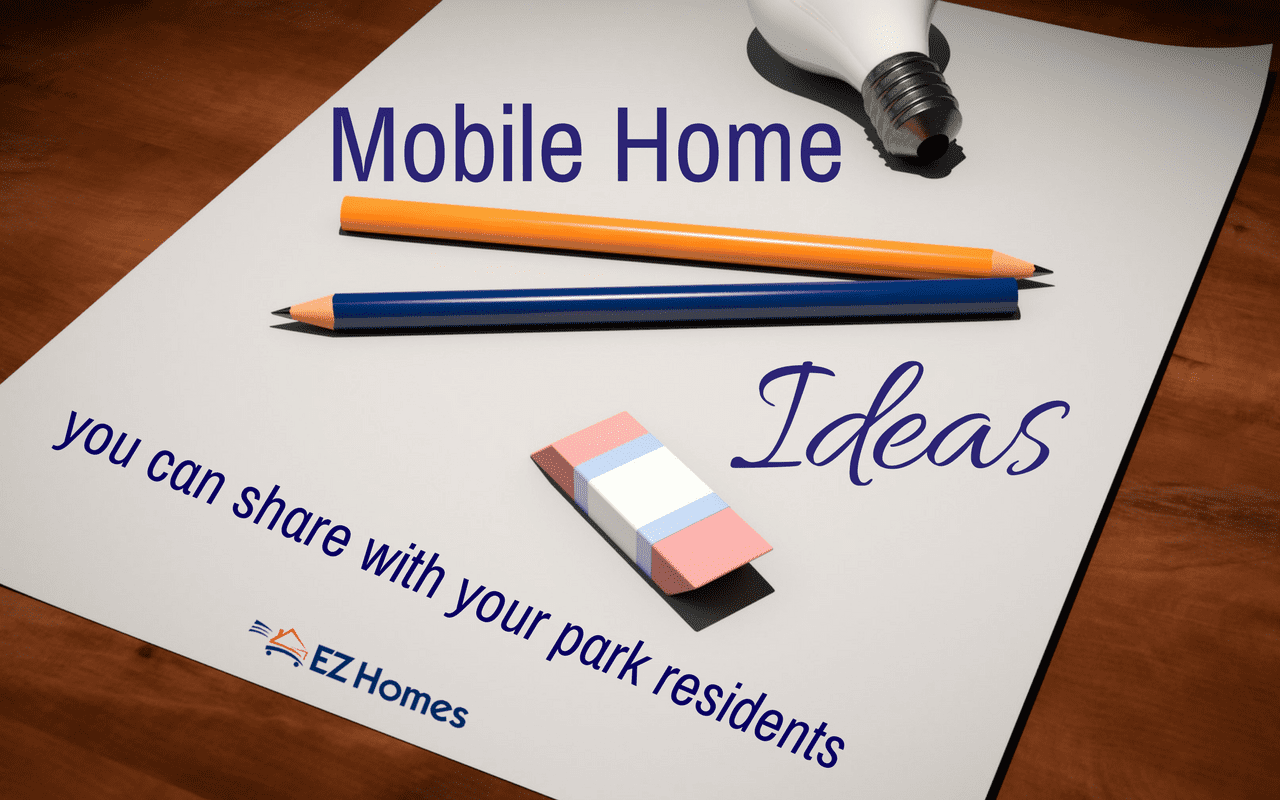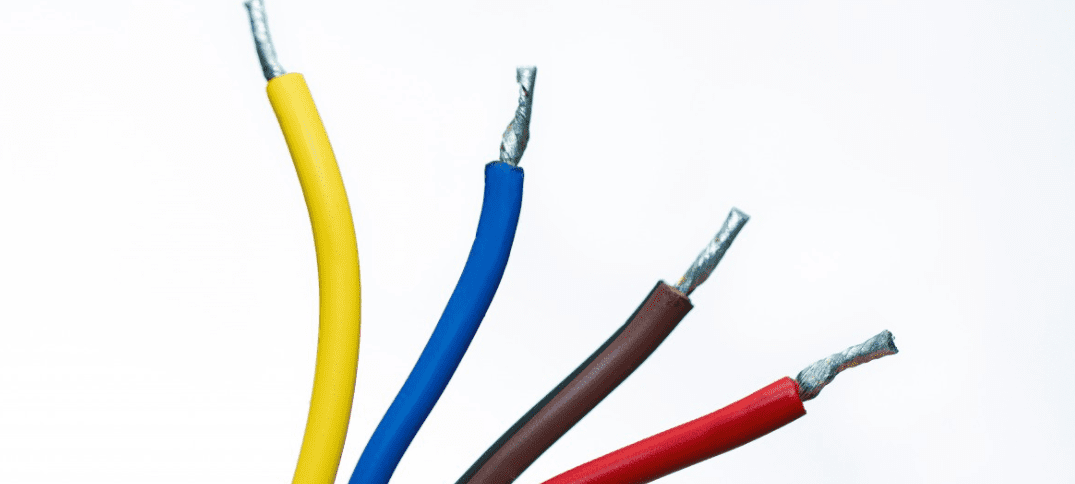Creating the ideal living community is not easy. This is especially true of mobile home parks. More and more people are adopting mobile homes as their accommodation of choice which means a lot of newcomers that don’t know all the tricks. Furthermore, everyone has their own ideas on things related to mobile homes which can quickly lead to chaos and a range of issues.

In this article, we’ll help you reign things in a little and improve the living experiences within the park for all your residents in one go by providing you with some ideas and tips to share with your residents.
Ideas for mobile home fire safety
Probably nothing else on this list plays as an important role in the wellbeing of everyone within the mobile home park as fire safety. Before the 1976 HUD Code that enforced stricter safety standards, mobile homes had an unfortunate (and lethal) reputation for fire accidents that earned them the name “matchbox houses.”
Mobile homes are still slightly more susceptible to fires than stick-built homes despite improvements. Fires can quickly spread to neighboring houses and, in the worst case, engulf the park. Gas for fuel is also very common in these parks which makes it even more dangerous.
Mobile home fires are avoidable by following just a few common sense fire safety tips. Some of these are prescribed in law but hard to enforce. That’s why it’s a good idea to share even the most basic tips with your residents and try to keep it foremost in their minds.
Only buy and allow HUD adhering homes
Mobile homes have struggled to shake this reputation despite major improvements in safety. Even at time of construction, HUD Code safety standards are meant to ensure that homes are built with safer materials that are fire retardant.
Homes that are HUD-certified will have a red HUD plate somewhere on the exterior or a certificate inside the home. So, ensure that park residents only bring HUD compliant homes with them and only fit lots with these homes yourself.
Install fire retardant insulation and materials
Most owners will install insulation for winter regardless of where they are. Insulation has often been a culprit for helping home fires along as most materials are extremely flammable. However, nowadays you get insulation that’s rated for fire safety.
If your park is situated somewhere that experiences intense cold, it’s even more important that you try and get residents to use only fire retardant insulation. Other materials, like decorative wall panels, etc, can also be constructed from fire-retardant materials.
Inspect the home’s electricity regularly
Depending on your specific lease agreement, this will either fall under park management’s or the resident’s responsibility. Even if it is your responsibility to inspect or fix electrical problems in the homes, you should encourage your residents to inform you as soon as they experience problems.
Electrical fires often start with small problems like shorting outlets or unstable electrical supply. Electrical fires account for 51 thousand home fires yearly.
Responsible use of heating appliances or fire
It’s not just problems with electrical systems that cause home fires, but appliances as well. Especially those used for heating. Electrical blankets, space heaters, and cooking appliances are most often at fault. To make matters worse, today you even get mobile homes with fireplaces!
It should be common sense to turn off all these appliances when they are no longer used or when residents head to bed. Candles should also be put out as soon as possible (Christmas, we’re looking at you). This also means closing gas valves.
Other tips:

- Gas cylinders and firewood need to be stored some distance from the home. State regulations specify the distance.
- Smoke alarms should be working. The NFPA 501 regulations stipulate how many fire alarms homes should have and where they should be placed. They need to be checked regularly for working order.
- If you own the homes, you can ask residents to only smoke outside of the home or encourage them to do so.
- Encourage residents to come up with a plan of escape in case of a fire. If you have standard home designs, you should plan it for them and distribute it.
- You should also have a park-wide evacuation plan that residents are aware of.
- Ramp up your warnings ahead of the holiday season. This is a time when accidents are particularly likely to happen. Give them seasonal specific safety tips, like getting rid of Christmas trees soon and not running Christmas lights longer than they have to.
Tips in case of a disaster
As a mobile home park owner, you don’t have any control over natural disasters occurring or preventing them from affecting the park. However, what you can do is to prepare your residents in the event that one occurs. We will focus on tornadoes and hurricanes for this.
Understand weather patterns in the area
“Tornado-season” and “Hurricane-season” aren’t just catchy terms. They are exactly what they say they are. Hopefully, your mobile home park isn’t located in an area that experiences these phenomena in the first place, but if it is, you should find out which periods are at risk.
For example, hurricanes only really occur in the southeast during June to November. You can ramp up your efforts to prepare your residents prior to these few months. Make sure your residents are aware of these periods anyway and what events are likely.
Install and keep tabs on a NOAA weather radio
If you are in an area that is at risk, it’s a good idea to either install these radios yourself or to have residents install them. They broadcast any emergency news or updates regarding these events.
There are also apps and SMS broadcasts you can have your residents sign up to. These are effective because individuals can also provide news via them.
Inform them of evacuation procedures
You can write a whole guide dedicated to evacuation procedures. However, as we just want to inform you of the fact that procedures like these exist, we will just provide you with the basics.
Every resident within the park should be aware of the park’s emergency procedures and show their willingness to follow them. As procedures are required by law, you might be in trouble if residents don’t follow them and you can’t show that you have put in a reasonable effort to ensure everyone is aware of them
It usually stipulates these points:
- Where residents should assemble within the park.
- Where the nearest disaster shelter is outside of the park.
- Plans to provide emergency water and electricity if there are interruptions to the supply.
In case of other disasters
There are specific steps to follow for different kinds of natural disasters. You should also consider the likelihood of floods and heavy snow storms when providing your residents with safety tips and procedures.
As a mobile home park owner, you should know all of this yourself, have a safety consultant on hand, or know where to access this information. The onus is on you to make sure the same goes for your residents.
Ideas for decoration and upgrades
For all their benefits, mobile homes aren’t always the most attractive. They are built for practicality and affordability, not the cover of magazines. This is changing and more attractive options are on the market, however, it still means that many mobile home owners try to upgrade and improve their home.
This could lead to a few problems, some of them related to the actual look of homes in your park as well as to the integrity of the homes. For example, you might want a relatively uniform look in the park.
Physical additions to homes
This depends mostly on whether the homes are park-owned or resident-owned. If they are owned by the residents you have to be reasonable with your demands. After all, it is their property. If it is park-owned, you have almost complete control.
The main thing you want to do is to preserve the HUD compliance of the home and its integrity. To do this, you should come up with a list of home improvements that aren’t likely to affect this. Think of new steps, a patio that doesn’t bear on the home, decorative eaves, etc.
You can also come up with complete no-no’s like complete rooms built onto the home, etc. If tenants who rent the home want to improve it for you, let them. You should just retain enough control to protect your homes.
One good idea is to provide residents with the contact details of a reputable contractor. Look for contractors that pledge their adherence to the HUD code.
Repairs

Again, this depends on your lease agreement and what’s specified under your and the tenant’s responsibilities. We would also recommend that you come up with things the tenant can/should fix themselves if they want to and which kind of repairs they should contact management.
Harmless tasks like changing light bulbs, repairing windows, etc. could be left up to them while furnace repair or maintenance, fire alarm maintenance, and damage to the structure of the home should be left to you.
To ensure that everyone in the park has the same level of maintenance, you might want to provide your residents with the contact details of a particular contractor or repairman you trust.
Decorative changes
People want to make their home theirs, sometimes even if they don’t own it. Rather than completely deny your tenants this privilege, draft ideas and rules that will help them stay within your boundaries.
Some of these changes like a new coat of paint, a pitched roof, new skirting, etc. improve the value of the home and the curb appeal of your park. Once again, to ensure that chaos doesn’t break out within the park and depending on your commitment to a certain aesthetic or style, you should provide your residents with guidelines for acceptability.
Mobile home ideas for energy efficiency
There are plenty of reasons why you should encourage your park residents to be more energy efficient. For one, it’s everyone’s responsibility to do what we can to lessen the load on mother nature and decrease our energy footprint. Secondly, if residents spend less on their utility bills then that leaves them more likely and willing to pay their rent. Thirdly, many of these measures also make their lives more comfortable and increase the home’s value.
- Install and maintain insulation: Many people aren’t aware of how drastically insulation really affects a home’s energy efficiency. Just 5% of missing insulation can reduce its efficiency by up to 54%. Urge residents to check their insulation yearly, especially before winter, to see if it’s in good condition and repair it or contact you to fix it.
- Install window film: Window film is a surprisingly effective way to increase a home’s energy efficiency in summer or winter at very low cost. It’s an excellent suggestion to make to your tenants as it’s affordable and removable.
- Report damage to the home: You should tell your tenants to immediately contact you if they find damage to the walls. Even small cracks that naturally develop can lead to a loss of insulation. You should have these caulked up or fixed as soon as possible.
- Install weatherstripping: Weatherstripping seals the tiny openings between window panes as well as doors and their respective frames. It’s another cheap, easy to install, and completely removable addition that provides great results.
Share these ideas and see what your residents come up with!
There you have it! Hopefully, you’ve taken some things away from this article of mobile home ideas to share with your residents. If nothing else, they will appreciate the fact that you place so much emphasis on their wellbeing and living standards. This is one way to improve the overall livability and standards within your park that every landlord should use.


